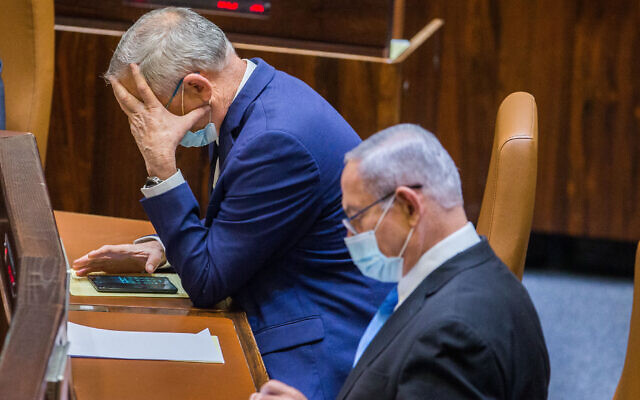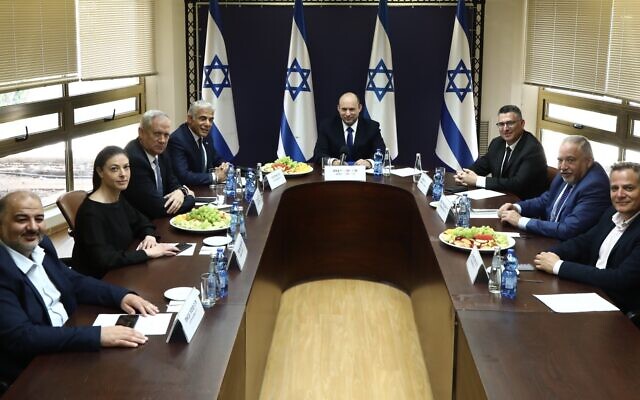Defense Minister Benny Gantz vowed Saturday that he would not sit with opposition leader Benjamin Netanyahu in a coalition again, warning against the former prime minister’s desire to establish a narrow right-wing government after the upcoming election.
In a TV interview blitz, Gantz argued that he is the only candidate who can cobble together a majority.
“If Netanyahu establishes a government of 61 [seats] I request that you call me for an interview on the end of the state. This will be an extremist government that will drag the country to the brink and to further radicalization — I will not be a part of it,” he told Channel 12 news.
According to Gantz, he would not partner with Netanyahu as part of a rotating premiership even if he served as the prime minister first, claiming he had already refused such an offer.
Following elections in March 2020, the third within a year, Gantz entered into such a partnership with Netanyahu despite an explicit campaign pledge not to partner with the then-prime minister. Netanyahu served first as premier with Gantz due to take over after 18 months, but the coalition collapsed amid disputes over approving the state budget in a move many saw as designed to keep Gantz out of the prime minister’s seat.
Get The Times of Israel's Daily Edition by email and never miss our top stories
Gantz is now running as head of the National Unity party, an alliance between his Blue and White party and Justice Minister Gideon Sa’ar’s New Hope, along with former military chief Gadi Eisenkot. The defense chief has insisted Prime Minister Yair Lapid — an erstwhile partner — will not be able to amass the 61 seats needed to form a government after the November 1 election and has been campaigning on an unlikely plan to unite parties from across the political spectrum in a big-tent ruling coalition. Opinion polls predict National Unity will pick up 11-12 seats.

Defense Minister Benny Gantz, left, and Prime Minister Benjamin Netanyahu seen during a vote at the Knesset, in Jerusalem on August 24, 2020. (Oren Ben Hakoon/Flash90)
Despite the poll numbers, Gantz asserted that this proposed coalition was possible. He noted that politicians who previously never thought they would form a government together have joined up in the past, a reference to the outgoing coalition that brought together parties from across the political spectrum including an independent Arab party, Ra’am.
Gantz praised Lapid’s speech last week at the UN General Assembly, but said he differed with the premier over the premier’s call for a two-state solution with the Palestinians, charging that it was “impossible to rely on dreams.”
In a separate interview with the Kan public broadcaster, the defense minister stressed the need to “settle our relationship with the Palestinians” and offered his solution of “two entities,” avoiding the word “states.”
“It can’t be a state that will endanger Israel. What do you want, that what happened in Gaza will also happen to Kfar Saba?” Gantz said, echoing a line from Netanyahu’s response to Lapid’s speech.
Gantz also took a conciliatory tone to the ultra-Orthodox parties, which as part of Netanyahu’s religious-right bloc were not in the last government.
“It is to the Haredim’s benefit to be a part of the government. I don’t think we should work against them. We need to live with one another,” he said.
While denouncing the Arab nationalist Balad party as “anti-Israel,” Gantz said he would be glad to cooperate again with Ra’am chair Mansour Abbas and praised him for his work in the coalition.

The heads of the eight parties making up the new government meet in the Knesset on June 13, 2021. Left to right: Ra’am head Mansour Abbas, Labor chief Merav Michaeli, Blue and White head Benny Gantz, Yesh Atid leader Yair Lapid, Yamina chief Naftali Bennett, New Hope head Gideon Sa’ar, Yisrael Beytenu chief Avigdor Liberman and Meretz leader Nitzan Horowitz. (Ariel Zandberg)
The defense minister told Channel 13 that far-right MK Itamar Ben Gvir — leader of the ultranationalist Otzma Yehudit faction in the far-right Religious Zionism alliance — was too extreme to be a part of a coalition he would lead.
“I don’t accept either Kahane’s or Goldstein’s view, and I don’t accept Ben Gvir’s rending of Israeli society — his way is extreme and his behavior is extreme,” Gantz said.
Ben Gvir has long been a disciple of the late racist Rabbi Meir Kahane, who advocated transferring Israel’s Arabs out of the country. Kahane’s Kach party was declared a terrorist organization by both the Israeli government and the US State Department a few years after the rabbi’s assassination in 1990, after which it disbanded.
Ben Gvir also used to have a picture of Baruch Goldstein — who in 1994 massacred 29 Palestinians at prayer in Hebron’s Tomb of the Patriarch — hanging in his home.
In an interview Saturday, the Otzma Yehudit chief claimed that he has changed over the past two decades and is no longer as devout a Kahanist as he used to be, though he said he still admired the rabbi.
“Kahane was right in that he fought antisemitism and was for the death penalty for terrorists, but today I don’t support expelling all the Arabs or separate beaches — I don’t continue the way of Rabbi Kahane,” Ben Gvir told Channel 12

Otzma Yehudit leader and MK Itamar Ben Gvir speaks to students at Blich High School in Ramat Gan, September 20, 2022. Photo by Avshalom Sassoni/Flash90)
Despite Ben Gvir insisting he has tempered his extreme views, an Otzma Yehudit candidate was caught on a hidden camera last week saying the more moderate tone adopted by the party was a “trick” to enter the Knesset, implying his true beliefs, if voiced publicly, could give cause to the High Court to disqualify him from running.
A recent opinion polls predicted that Netanyahu’s right-religious bloc would secure a narrow majority of 61 seats in the Knesset, suggesting growing support for the former premier and his partners ahead of upcoming elections.
Israeli TV polls are notably unreliable, but nevertheless often steer politician’s decision-making.


